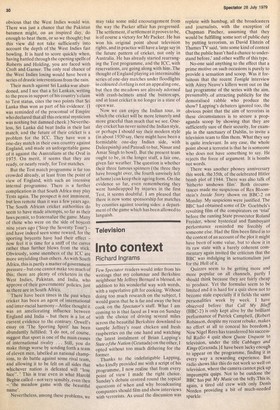Television
Into context
Richard Ingrams
Few Spectator readers would infer from his writings that my columnar and Berkshire neighbour Mr Jeffrey Bernard is blessed, in addition to his wonderful way with words, with a superlative gift for cooking. Without doing too much research on the subject, I would guess that he is far and away the best cook on the Spectator's staff. What I am coming to is that faced as I was on Sunday with the choice of driving several miles across the beautiful Berkshire downland to sample Jeffrey's roast chicken and fresh raspberries on the one hand and watching the latest instalment of Brian Lapping's State o fthe Nation (Granada) on the other, I opted without too much dithering for the former. Thanks to the indefatigable Lapping, who kindly provided me with a script of his programme, I now realise that from every point of view I made the right choice. Sunday's debate centred round the topical questions of when and why broadcasting companies should film and show Interviews with terrorists. As usual the discussion was replete with humbug, all the broadcasters and journalists, with the exception of Chapman Pincher, assuming that they would be fulfilling some sort of public duty by putting terrorism, as David Elstein of Thames TV said, 'into some kind of context that the public hasn't had a chance to understand before,' and other waffle of this type.
No-one said anything to the effect that a prime motive on such occasions is purely to provide a sensation and scoop. Was it fortuitous that the recent Tonight interview with Airey Neave's killers went out on the last programme of the series with the aim, presumably, of attracting publicity for the demoralised rabble who produce the show? Lapping's debaters ignored too, the obvious point that the aim of terrorists in these circumstances is to secure a propaganda scoop by showing that they are sufficiently sure of their security, for example in the sanctuary of Dublin, to invite a television team to film them. What they say is quite irrelevant. In any case, the whole point about a terrorist is that he is someone who does not have something to say. He rejects the force of argument. It is bombs not words.
There was another phoney anniversary this week, the 35th, of the celebrated Hitler bomb plot of 1944. There was also talk of 'hitherto unshown film'. Both circumstances made me suspicious of Rex Bloomstein's Inside Story shown on BBC-2 on Monday. My suspicions were justified. The BBC had obtained some of Dr Goebbels's revolting film of the conspirators on 'trial' before the ranting State prosecutor Roland Freisler, whose hysterical and flamboyant performance reminded me forcibly of someone else. Had the film been fitted in to the context of an account of the plot it might have been of some value, but to show it in its raw state with a barely coherent commentary again invited the criticism that the BBC was indulging in sensationalism just for the Hell of it.
Quizzes seem to be getting more and more popular on all channels, partly I should think because they are fairly cheap to produce. Yet the formulas seem to be limited and it is hard for a quiz show not to become stale especially if it fields the same personalities week by week. I have observed before that Call My Bluff (BBC-2) is only kept alive by the brilliant performance of Patrick Campbell, (Robert Robinson, despite my recent rebuke, makes no effort at all to conceal his boredom.) Now Nigel Rees has transferred his successful Radio 4 quiz show Quote Unquote to television, under the title Cabbages and Kings (Granada.)I have been lucky enough to appear on the programme, finding it in every way a rewarding experience. But radio shows like this do not work so well on television, where the camera cannot pick up impromptu quips. Not to be outdone the BBC has put My Music on the telly.This is, again, a tired old crew with only Denis Norden providing a bit of much-needed sparkle.






































 Previous page
Previous page